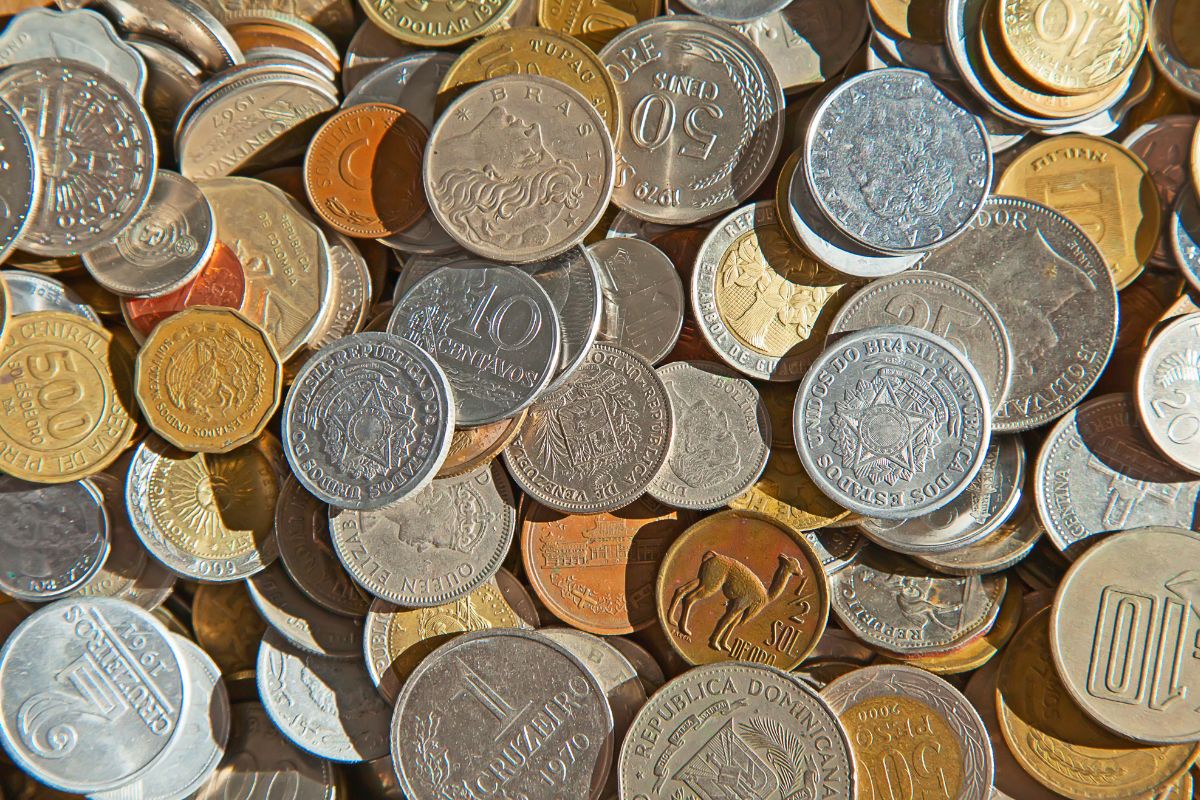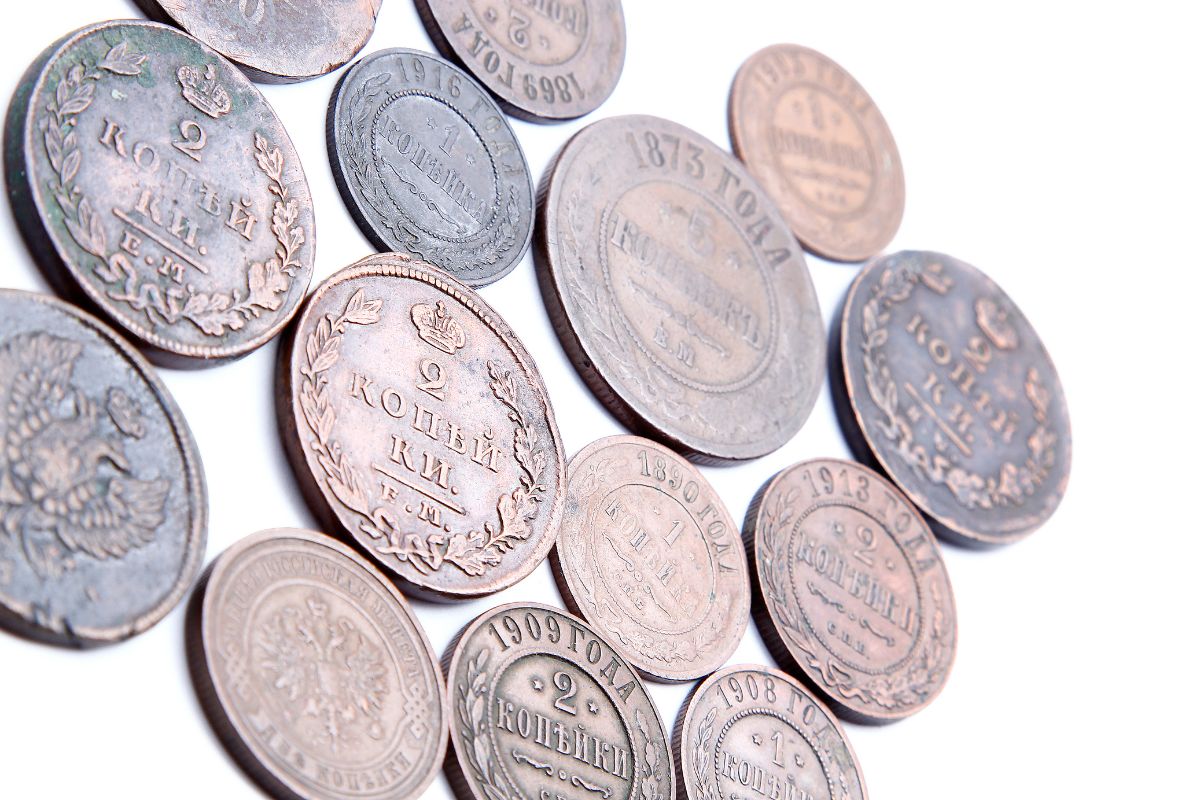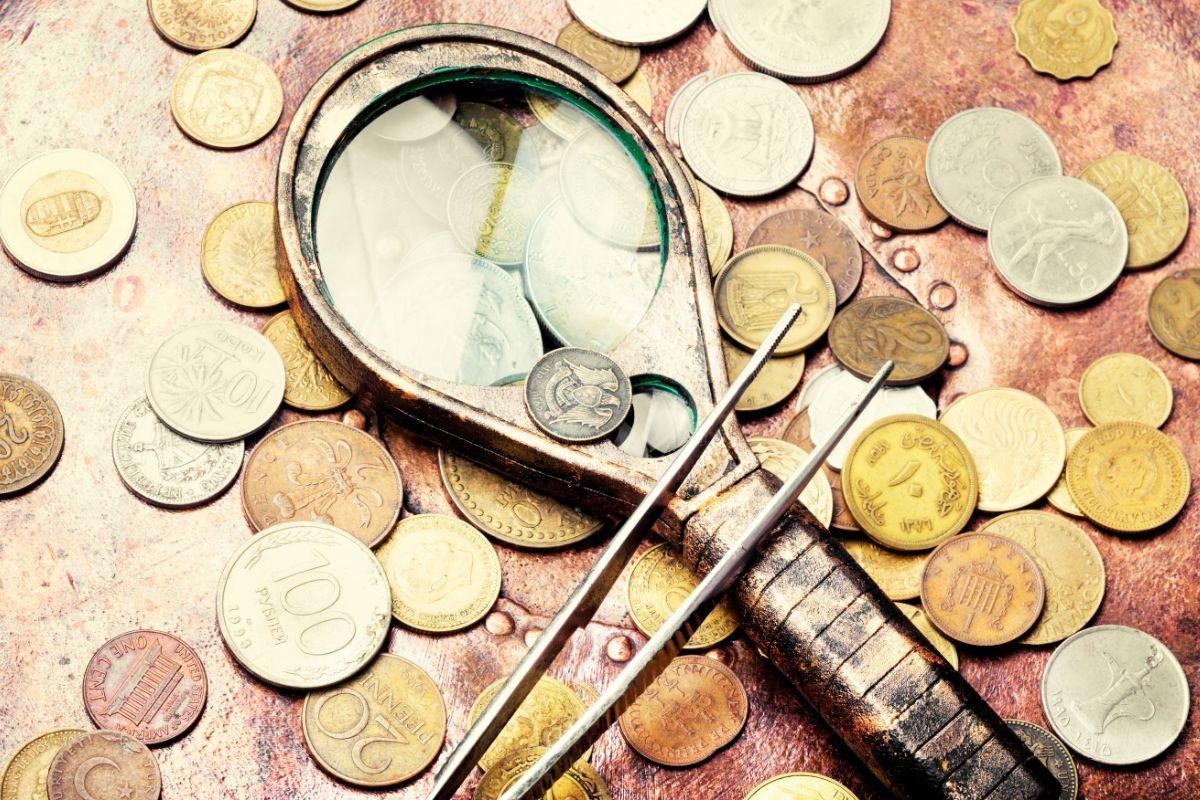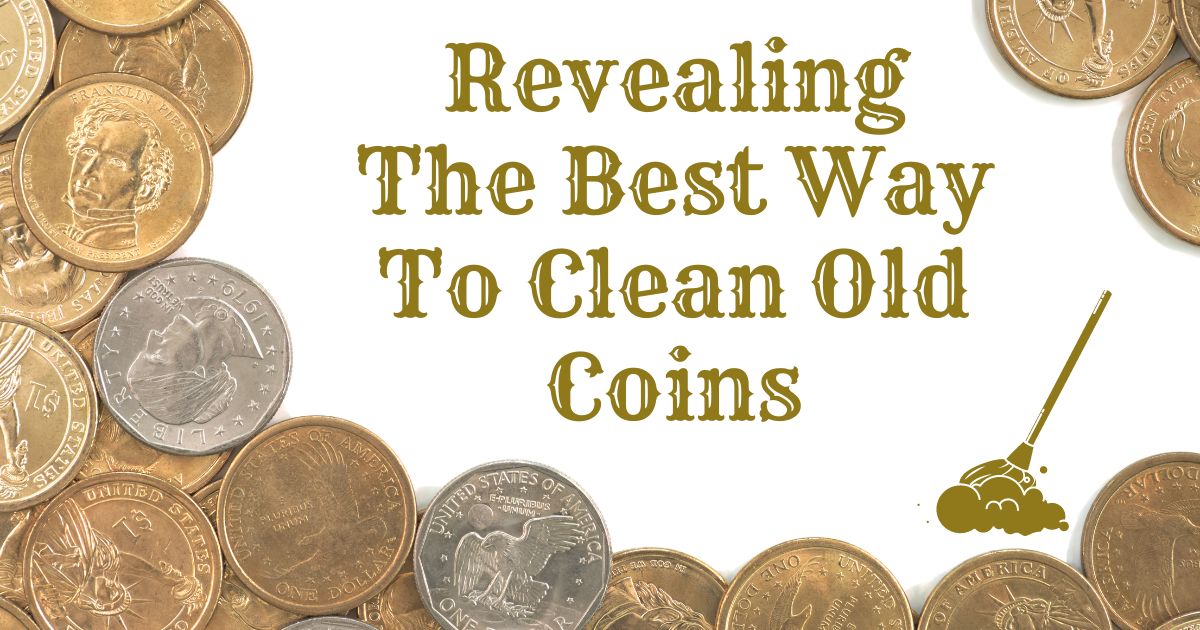The Importance of Cleaning Coins
Cleaning old coins of accumulated dirt can be a dangerous undertaking. But what is the best way to clean old coins? Only if the coins hold sentimental significance for you and you have no intention of selling them. It takes a soft touch to do it well, and it’s critical to use suitable materials and techniques to prevent damaging your valuable currency.
Cleaning your coins is not recommended; in fact, collectors prefer rusted old coins to clean ones.

Supplies Need for Coin Cleaning at Home
To clean your coins thoroughly, here is what you will require:
- Water: One of the least destructive ways to clean your coins is to run them under regular tap water. If you feel that the water in your home is hard or acidic, try using distilled water instead of tap water.
- Soap: Cleaning your old coins with mild dish soap and water might help release some of the accumulated filth. Fill a small plastic container halfway with warm water, drop in a few drops of mild soap, submerge the coins, and clean with your fingers or a soft toothbrush.
- The acetic acid in white vinegar is a common ingredient in DIY eco-friendly cleansers. It helps help to wear away the contamination on your coins. Hydrogen peroxide is good to remove a wide range of things, including organic matter.
- Mouthwash: In addition to cleaning your breath, Listerine and other antiseptic mouthwashes can be used to safely clean dirt, oil, and debris from old coins.
The Best Way to Clean Coins – 6 Ways
There are several ways in which you can clean your coins. Each of these methods is just as effective:
How to Clean Coins with Baking Soda
- Two bowls
- Water
- Baking soda
- Soft cloth
Pour your coins into one bowl and cover with cold water. Pour one teaspoon of baking soda into another bowl. Scrub the coins with the toothbrush dipped in baking soda. Baking soda will clean the filth and won’t scratch the metal. Rinse the coins well and dry with a soft cloth.
How To Clean Coins with Coke
Who knew your favorite beverage could also clean coins? Yes, Coke’s phosphoric acid can remove tarnish and corrosion. You will require the following:
- One bowl
- One can of Coke
- One soft cloth
Fill the dish with coins and Coke. After 5 minutes, check to see if it removes the corrosion. If the coins are still dirty, return them to the basin for 15 minutes. The soda can dissolve metals if left longer than 15 minutes. Next, rinse the coins well and dry them with a soft cloth.
How Clean Coins with Hydrogen Peroxide
Have you ever been given change and shuddered at the dirty and oily coins? Peroxide will help. Hydrogen peroxide will clean and sanitize the coins. You will need:
- One bowl
- Hydrogen peroxide
- Water
- Soft cloth
Pour enough hydrogen peroxide over the coins to cover them. Soak coins for 24 hours. Rinse and dry them.
How to Clean Dirty Coins with Vinegar
Vinegar’s high acidity is ideal for cleaning and whitening money. Cleaning dirt, grease, and rust coins bring out their inherent shine.
- One bowl
- White vinegar
- Water
- Old toothbrush
- Soft cloth
Fill a dish with white vinegar to cover your coins. Soak the coins for 30 minutes or overnight. Remove the coins and gently clean the residue. Rinse and dry with a cloth.
Cleaning Coins with Ketchup
Did you know ketchup can clean coins? The salt and acidic tomatoes can help remove years of filth from your coins. You will require:
- One bowl
- Tomato ketchup
- Water
- Soft cloth
Put your coins in a basin and cover them with ketchup. Soak the coins for 30 minutes or overnight. Remove the coins and gently clean the residue. Rinse and dry with a cloth.
Cleaning Coins with Lemon
Use an acidic solution from lemons to clean your coins. Lemons’ acidity dissolves dirt. This procedure is ideal for removing the brown oxidation that dulls the copper sheen of pennies. You need:
- One teaspoon salt
- 1/4 cup lemon juice
- Soft cloth
Place one teaspoon salt and 1/4 cup lemon juice to cover the coins in a bowl. Soak the coins for 5-15 minutes. Remove the coins and gently clean the residue. Rinse and dry with a cloth.

Should you Clean Old Coins?
It is never a good suggestion to clean coins, but if you must clean them, please follow the instructions outlined below to avoid damaging them. Never clean coins with metal polish or acid! Abrasions or chemical interactions with the metal will permanently destroy your coin. This harm is irreversible. These compounds can also be corrosive, causing injury or death.
Your main concern should be safety. Any cleaning operation, big or small, has the potential to inflict harm. An adult must supervise this activity. Enjoy washing your coins after you’re safe! One of the only times you would ever want to clean coins would be if you were helping a young coin collector begin a coin collection from circulating coins.
Circulating coins can be filthy and carry germs, and this is the only instance in which a beginning coin collector should clean coins.
How to Polish a Coin
Here are simple steps to follow when polishing coins:
- Wash your hands: Using soap to wash your hands will remove oils and dirt from your fingers.
- Place a soft towel on your work surface: Place a soft cloth or towel on your work surface, folded over a couple of times, to catch coins you might drop and offer a room for them to dry. Fill a small plastic container halfway with warm tap water to create a soapy bath. You should not use glass, china, or metal because they can harm your coins! This is when disposable food storage containers come in handy. Just don’t keep your coins in there for a long time. Fill the container with warm water and a tiny amount of mild dishwashing detergent. Don’t use too much—just a spray will be enough. Make sure you have a final rinse ready. Fill a second plastic container for the final rinse halfway with distilled water. Although distilled water is preferred, you can use hot running tap water instead. Please pick up the first coin and dip it in soapy water to clean it. Gently brush the coin between your fingertips on both sides, paying attention to any stickiness or filth. Rub the muck away from the coin’s center rather than into it. Work in an outward direction at all times. Dirt and crud at the edges should merely get pushed over the side of the coin, using your thumb. Do not toss all of your coins into the water at the same time! Do them one by one. Otherwise, the coins will rub against one another, leaving scratch marks on the surfaces.
- Rinse the coins: Gently massage the coin under warm flowing water to remove any soap residue. Always keep in mind that gentleness is the key! Don’t rub too hard, and if you feel any grit on your fingers, even if it’s light grit, don’t massage it into the coin because it will easily scratch it. Instead, agitate the coin by rapidly moving it in the water to dislodge the grit; only gently touch it to free it up if necessary. Direct every movement of your fingers to avoid scratches on the coin’s surface.
- Rinse again: Using distilled water, swish the coin around to eliminate any chlorine residue or other pollutants that may be present in tap water. Next, gently agitate the coin by holding it by the edge. You should no longer touch the coin on its face at this time. When using your bare fingers, only touch the coin’s rim. If you have no choice but to use tap water for the last rinse, run the coin under hot water.
- Allow the coins to dry: If you used distilled water to rinse the coin, you could leave it to air dry on the towel. Because distilled water is free of dissolved minerals and other contaminants, the coin should dry without spots. If you must finish with the last rinse in hot tap water, pat the coin dry gently to avoid staining.
- Repeat until all of your coins are now clean: Wash the rest of your coins one at a time, carefully following all the steps. If you come upon a coin that needs to soak for a while to get clean, place it in a separate tub of water, so it doesn’t get dingy from another coin in the tub. Before putting your coins away, be sure that they are completely dry. Damp coins will deteriorate over time. Always hold coins by their edges while handling them.
Our Tip Tips for Cleaning Old Coins
It’s no surprise that collectors look for ways to clean and keep their coins looking bright and brilliant, given the sentimental worth of their collections and the amount of patience that went into their creation. The best part is that it’s pretty simple to accomplish, and the results are stunning!
So, without further ado, here are two methods for cleaning new coins and older and tarnished coins.
How to Clean Dirty Coins
Newer coins are rarely tarnished or corroded, but they do become filthy when they pass from person to person. Furthermore, coins that have recently been in circulation may be full of germs, necessitating the following process to clean and sanitize them. This is what you must do:
- Mix 1/2 to 1 cup warm water and a teaspoon of liquid dish soap in a plastic container or bowl.
- Rub the coin between your thumb and index finger while holding it under running water for about ten seconds.
- Dip the coin in the warm, soapy solution and continue rubbing away loose dirt with your thumb and index finger.
- Brush away any hardened dirt/stains with an old, soft-bristled toothbrush.
- Rinse the coin under running water.
- Air dry or pat dry with a soft towel.
How to Clean Tarnished Coins
Older coins from the 19th century are prone to rust if not cleaned properly. Older coins may be dull and tarnished to the point of being unrecognizable, necessitating a little more effort to clean and revive. You’ll be relieved to learn how to clean old coins as it doesn’t need much effort. Here’s our tried-and-true method for cleaning tarnished coins:
- Pour one cup of white vinegar into a plastic container, such as the one used to store leftover foods or a small child-sized bucket, and soak four to five coins in it. The better the effect of the vinegar, the longer you leave them to soak. It’s best to understand how to clean corroded coins by soaking them overnight if they’re more than 50% corroded.
- Remove the coins and brush them clean with a soft-bristled toothbrush after sprinkling them with baking soda.
- Rinse them thoroughly in hot water, holding them with tongs or gloves to avoid burning your fingers.
- Lay them out on a soft cotton towel to air dry.

Final Thoughts
If you do not clean your coins properly, they may lose their value. Therefore, you must always consult a coin expert before cleaning your coins. We will not be held liable for any damage or loss of value due to coin cleaning.
You’ll be more proud than ever to show off your coin collection after employing the procedures outlined above to make it bright and shining. The best part is that everyone will be amazed and delighted to see how clean and sparkly they are!

